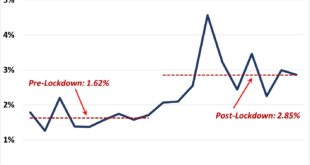from Lars Syll Both approaches to DSGE macroeconometrics (VAR and Bayesian) have evident vulnerabilities, which substantially derive from how parameters are handled in the technique. In brief, parameters from formally elegant models are calibrated in order to obtain simulated values that reproduce some stylized fact and/or some empirical data distribution, thus relating the underlying theoretical model and the observational data. But there are at least three main respects in which...
Read More »Open thread Dec. 9, 2022
Neoliberal economics, Big Pharma and pandemics
from Imad Moosa The spread of the virus has been aided by the neoliberal drive to privatise everything under the sun, including healthcare. Forty years of the privatisation of public health institutions (allegedly in the name of efficiency and for the benefit of consumers) has resulted in a disastrous situation as private healthcare providers have no commercial interest in preparing for or preventing emergencies. The spread has been aided by the lack of staff and material...
Read More »Yes, Virginia, Supermarket Profits HAVE Expanded
Supermarket executives were up on Parliament Hill this week, appearing before the Standing Committee on Agriculture and Agri-Food’s inquiry into food inflation grocery chain profits. They repeated the now-familiar argument that supermarkets have not caused food inflation, they have merely passed along higher input costs to their customers; their profit margins have been stable, it is claimed. Don’t believe them. Here are a few data points on the argument that the chains haven’t...
Read More »Jefferson rejected even voluntary emancipation
The Washington Post has a long piece about a Virginia family whose current (substantial but not huge) wealth derives from their slaveholding forebears and who may now be greatly enriched by the discovery of uranium under their land. There’s an interesting discussion of the arguments for and against reparations Buried in the middle of the article is something much more interesting, to me at any rate. One member of the family, Edward Coles, opposed slavery. He hid his views until he...
Read More »Stress, a negative externality, is ubiquitous
from John Komlos Stress, the body’s biological response to external threats, is generated in the economic system as a negative externality through countless pathways, that include long working hours, being underpaid, being evicted, income insecurity, unhealthy work environments, tight deadlines, being fired, long spells of unemployment, underemployment, low income relative to the median, reduction of earnings, unexpected medical expenses, college tuition, being victim of predatory...
Read More »Open thread Dec. 6, 2022
“Open thread Dec. 2, 2022,” Angry Bear angry bear blog Tags: open thread
Read More »Is economics nothing but a library of models?
from Lars Syll Chameleons arise and are often nurtured by the following dynamic. First a bookshelf model is constructed that involves terms and elements that seem to have some relation to the real world and assumptions that are not so unrealistic that they would be dismissed out of hand. The intention of the author, let’s call him or her “Q,” in developing the model may be to say something about the real world or the goal may simply be to explore the implications of making a certain...
Read More »The real economy is never in equilibrium
from Philip George What are vectors? . . . we defined a vector as a quantity having both magnitude and direction and represented it by an arrow. This makes sense in Euclidean 3-dimensional space. But in higher dimensions the idea of direction is not intuitive and we need a more formal definition that is consistent with the definition in three dimensions. In mathematics, an object is defined as a vector if it is an element in a vector space. This seems a circular...
Read More »Knowledge and growth
from Lars Syll If you have an apple and I have an apple and we exchange these apples then you and I will each have one apple. But if you have an idea and I have an idea and we exchange these ideas, then each of us will have two ideas. George Bernard Shaw Adam Smith once wrote that a really good explanation is “practically seamless.” Is there any such theory within one of the most important fields of social sciences — economic growth? In Paul Romer’s Endogenous Technological...
Read More » Heterodox
Heterodox



